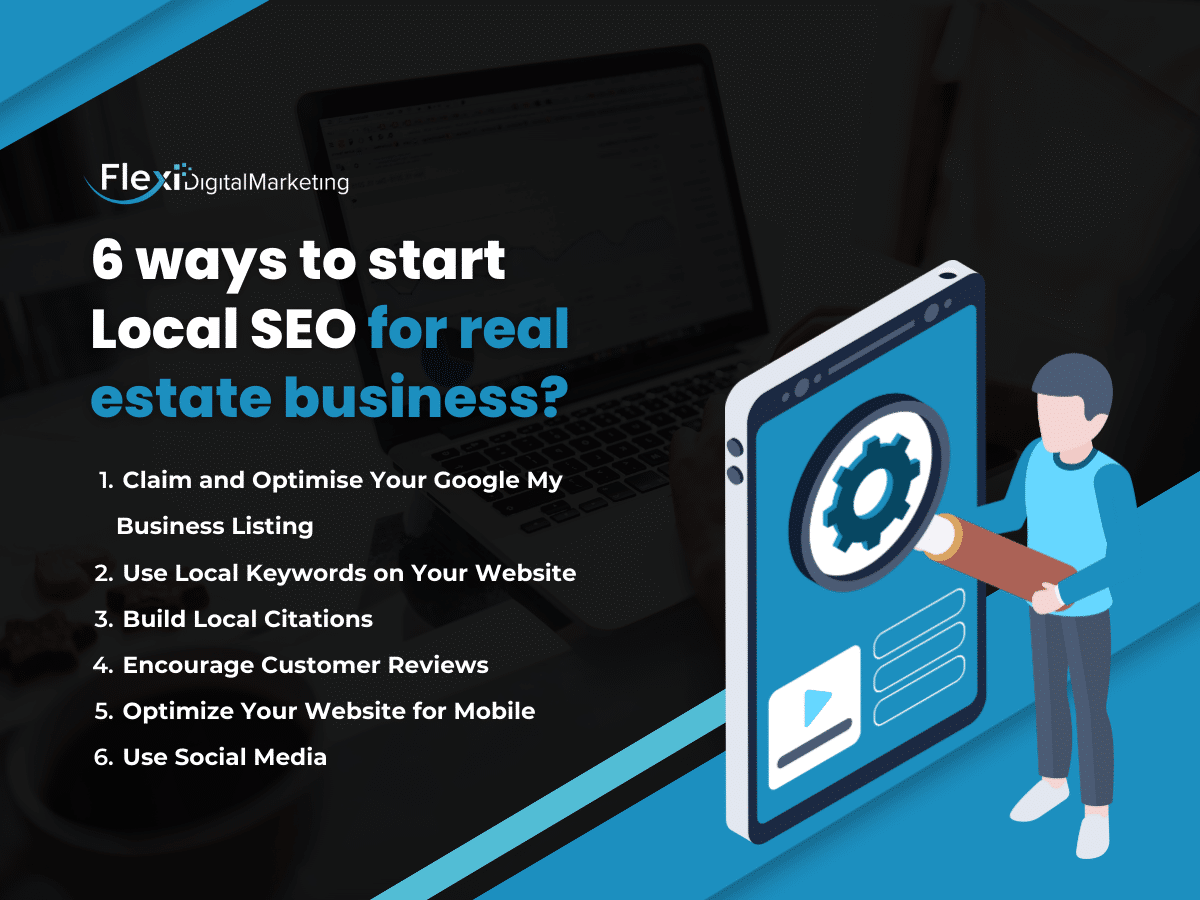For many years, SEO has been used by various businesses to build a robust online presence, enhance their social media, or invite visitors to their YouTube channels. Likewise, the real estate business should leverage this.
For real estate companies, SEO is essential to attract potential clients and stay ahead of the competition. However, optimising your website isn't enough - you must ensure it's optimised for local search engine optimisation (SEO) to reach your target audience. Local SEO for real estate websites focuses on optimising your website and online profiles to rank higher in local search results and attract more targeted traffic.
In this article, we'll take a closer look at what local SEO is, why it's vital for your real estate business, and how you can implement local SEO strategies to improve your online visibility and attract more leads.
What is Local SEO?
Local SEO optimises your website to rank higher in search engine results. It helps businesses reach their target customers in the local area and increase their online visibility. It involves optimising your website for local keywords, building citations, and creating content relevant to the local audience.
By implementing these strategies, businesses can improve their ranking on local search engine results pages (SERPs) and drive more website traffic. With the help of local SEO, companies can better connect with potential customers searching for them online.
What are the advantages of local SEO for real estate businesses?
Real estate businesses can benefit significantly from local SEO. With the help of local SEO, they can reach out to potential customers in their area and increase their visibility in the local market. Likewise, local SEO can be highly beneficial for real estate businesses for the following reasons:

1. Local SEO increases visibility on the internet and local search results
With the help of local SEO, real estate businesses can increase their visibility on search engines when people search for properties in a particular area. By optimising their website and online profiles for local keywords, such as "homes for sale in [city name]," real estate businesses can rank higher in search results and be found by potential customers.
2. Targets local audiences and traffic
Local SEO is an effective tool for real estate businesses to target local traffic and get more customers. By optimising their website for local keywords and including relevant information such as maps, directions, and contact information, real estate businesses can attract people specifically looking for properties in their area.
3. Enhances user experience
Local SEO for real estate businesses can also help enhance user experience on a website. Optimising your website for local SEO ensures that users can find the most accurate and up-to-date information about your business quickly and easily. It helps companies to reach customers in their area. It can significantly enhance the user experience by providing relevant and up-to-date information about local businesses.
This will help boost customer satisfaction and increase brand visibility and loyalty.
4. Develop a good reputation in the local community
As mentioned earlier, local SEO for real estate businesses helps reach out to their target customers in the local area. Real estate businesses can respond to reviews and showcase their expertise in the local market by claiming and optimising their Google My Business profile. As such, this can have a strong presence in their local market, establish themselves as an authority on the topic, and build a good reputation.
Additionally, local SEO can help real estate businesses build relationships with other local companies and organisations that can be beneficial for long-term success.
5. Execute a cost-effective marketing
Local SEO is a cost-effective way for real estate businesses to promote their properties and services to potential customers. Unlike outmoded advertising approaches like print or radio, local SEO can be done relatively cheaply and provide long-term benefits.
How to start local SEO for real estate businesses?
Now that we all know local SEO benefits real estate businesses, here are some steps to help you get started with local SEO.

1. Claim and Optimise Your Google My Business Listing
This is the first and most crucial step in local SEO for real estate. Claiming and optimising your Google My Business (GMB) listing will help your business appear in Google Maps and local search results.
It's free, easy to use, and can help you reach potential customers in your area. To claim your Google My Business listing, try these steps:
- First, visit the Google My Business website and sign in to your Google account. If you don't have a Google account, you'll need to create one.
- Once you're signed in, click the "Manage now" button in the top right corner of the page.
- Enter the name of your business and the address. Ensure your listing is complete and accurate, including your business name, address, phone number, website, hours of operation, and photos.
- If your business is already listed on Google, it may appear in the drop-down menu as you type. If it does, select it.
- If your business isn't listed, click "Add your business" and follow the prompts to provide your information.
- Google will then verify your business. You'll need to choose a verification method, such as by phone or mail, and follow the prompts to complete the verification process.
- Once your business is verified, you can manage your Google My Business listing, including updating your business information, adding photos, and responding to reviews.
2. Use Local Keywords on Your Website
Incorporate local real estate SEO keywords into your website content, such as your homepage, property listings, and blog posts. It's essential to include your location in your keywords to ensure your website appears in local search results.
Include the name of your city, neighborhood, and any other relevant location-specific terms. Here are some sample local SEO keywords for real estate:
- [City/Town] real estate
- [City/Town] homes for sale
- [City/Town] real estate agents
- [City/Town] real estate listings
- [City/Town] real estate market
- [City/Town] real estate trends
- [City/Town] real estate companies
- [City/Town] real estate brokers
- [City/Town] real estate agencies
- [City/Town] luxury homes
3. Build Local Citations
A citation is any online mention of your business name, address, and phone number (NAP). Building local authorities on directories, such as Yelp, Yellow Pages, and other accurate estate-specific directories, can improve your local search visibility.
4. Encourage Customer Reviews
Positive customer reviews on your Google My Business listing and other review sites can improve your online reputation and attract more leads. When customers leave reviews, it can increase engagement with your business. This can include responding to reviews, which can help build a relationship with customers and encourage them to return.
In addition, customer reviews often include keywords that can help with local SEO. For example, suppose a customer mentions a specific neighborhood or landmark in their review. In that case, it can help your business appear in searches for that area.
As such, encourage satisfied clients to leave a review by providing a link or requesting it in person.
Jumpstart Your Local SEO for Real Estate with Flexi Digital Marketing!
In conclusion, local SEO is essential for real estate businesses looking to attract more clients and improve their online visibility. By optimising their website for local search, real estate businesses can ensure they appear at the top of search results when potential clients search for properties in their area.
With these strategies, real estate businesses can improve their local SEO and attract more clients. And if you are still unsure where to start, contact Flexi Digital Marketing! Jumpstart your SEO campaign for your real estate business with Flexi Digital Marketing! Check out our SEO services.


